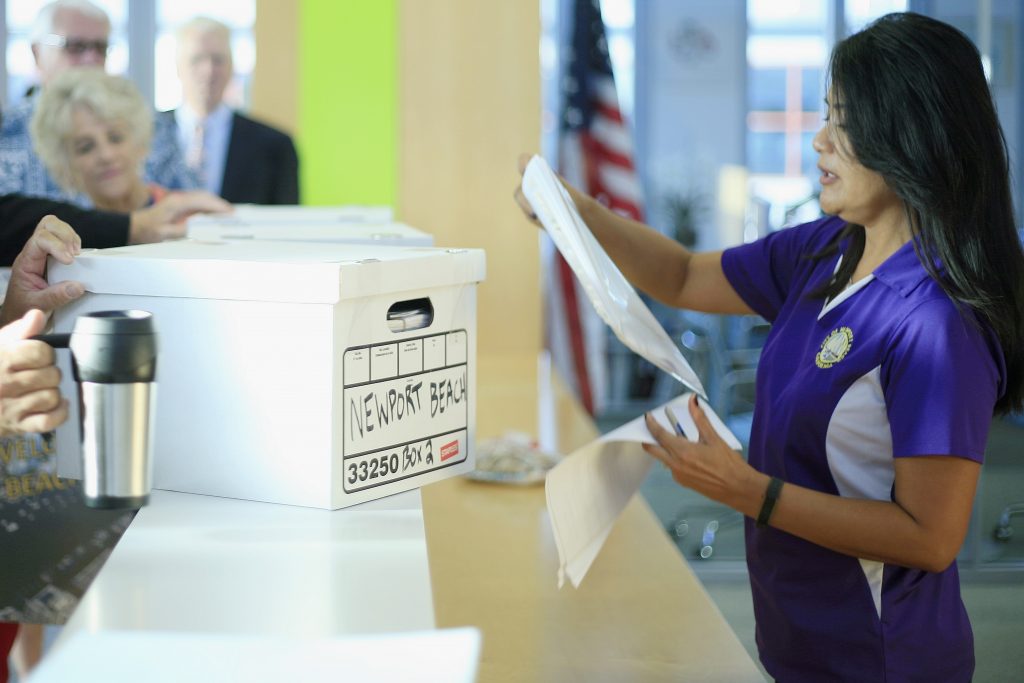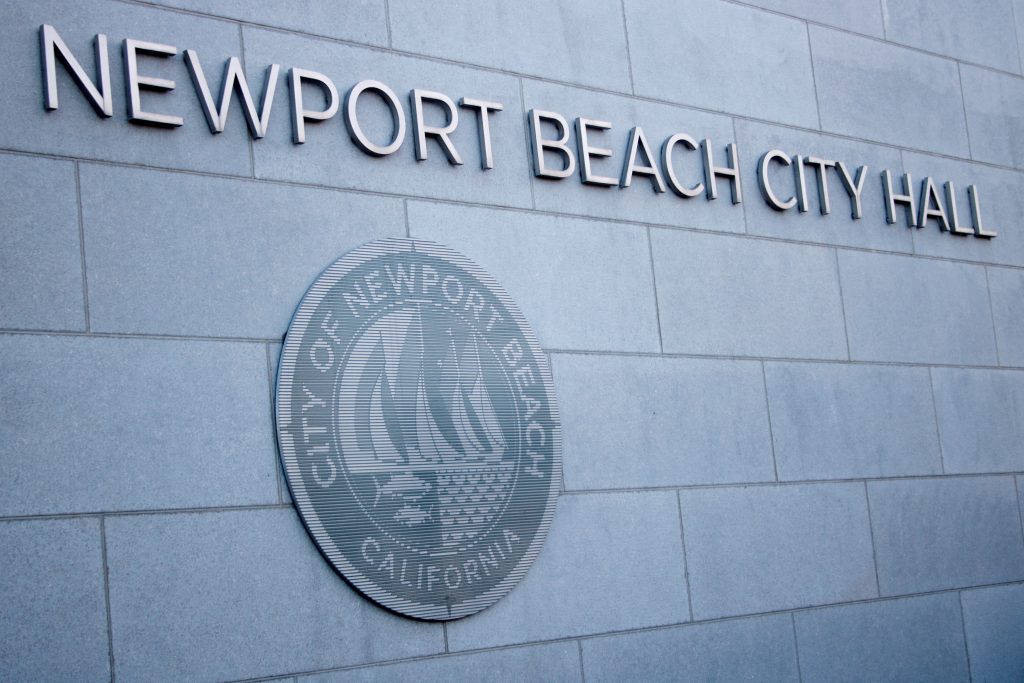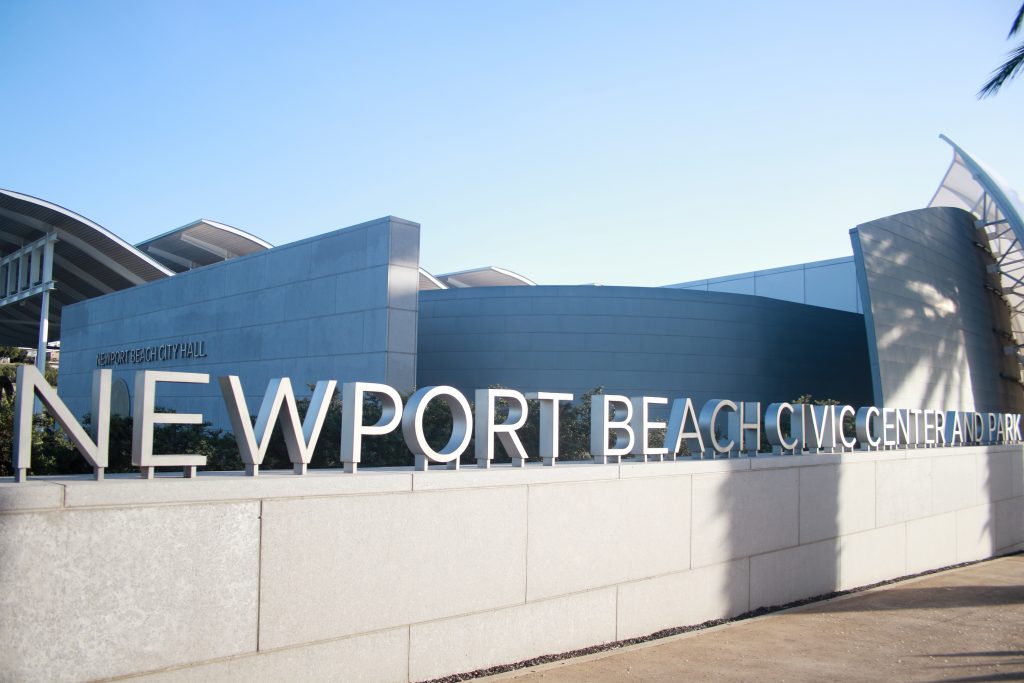
— Photo by Sara Hall ©
Following a recent Newport Beach City Council discussion and decision, there won’t be any extra local paperwork for paid signature gatherers hired to circulate petitions within city limits.
Council considered, but a majority ultimately decided against, incorporating state election laws into the city municipal code in order to require paid signature gatherers to submit copies of the state certificates they already have to fill out to the city clerk as well.
At last week’s meeting, Council voted 3-3-1, with members Brad Avery, Diane Dixon and Jeff Herdman voting no, and Scott Peotter abstaining.
The proposal came after findings of fraudulent signatures during the recent failed recall effort.
The Committee to Recall Councilman Scott Peotter submitted their signed petition on Oct. 27. In December, county officials found more than 2,100 signatures were found invalid for various reasons, causing the petition to be short by 106 valid signatures.
It was later reported that a paid signature gatherer forged about 50 signatures.
Newport Beach City Council voted on Feb. 13 to issue subpoenas to investigate the alleged voter fraud. Simultaneously, the Orange County District Attorney’s office confiscated the petitions on Jan. 4 as part of their own investigation into the same matter.
According to the staff report on the proposed ordinance change last week, the city didn’t find any municipal code violations in their investigation.
After the first motion died without enough support, Mayor Pro Tem Will O’Neill made a second motion without the new ordinance, but still rescinding the resolution that authorized issuing the subpoenas and agreeing to turn over the documents gathered during the city’s investigation to the OCDA for their own investigation.
The amended motion passed 5-1-1, with Herdman voting no and Peotter abstaining.
Both O’Neill and Muldoon argued in support of the proposed ordinance, saying it would protect voters and is verifying that paid signature gatherers know, understand and follow the rules.
O’Neill emphasized that it is not focused on volunteers, only paid signature gatherers coming into the city.
“At the end of the day, what we’re really talking about is… transparency and accountability on the issue of people coming into our city for paid signature gathering,” O’Neill said. “The only additional burden to them will be pressing the copy button once and sending it to our clerk. That’s it.”
State code already requires them to create the certificates, O’Neill said.
“I think paid signature gatherers likely know the rules, they should be trained and they should fill out the form for the state,” Muldoon said. “I think it’s good that they know that if they come to Newport Beach, they’re welcome, but they should follow the law.”
He would expect that any of the 50 or so residents whose signatures were fraudulently included would be upset that their rights were violated. Every citizen’s vote should count, he said.
“It is simply our intent to protect the voter integrity here in Newport Beach,” Muldoon said.
On the other side of the argument, Dixon and Herdman questioned the need for reiterating what state law already requires.
Dixon said she’s not convinced the city needs its own amendment, “as mild as you want to characterize it,” to a state election code that already applies to all cities and municipalities in California.

— Photo by Sara Hall ©
“Since when does the city of Newport Beach have to embellish state law to do what the state law is already doing and the [OC] District Attorney is already prosecuting violations of that state law?” Dixon asked.
The law is already established and people knowingly break laws all the time, Herdman commented.
“How is adding this additional layer of bureaucracy and requirements going to prevent this from happening again?” Herdman asked. “It’s almost a rhetorical question.”
If someone wants to forge signatures, they’re going to do it, no matter what the city code, or state law for that matter, says, Herdman noted.
“No matter how many layers we add to it or requirements we add to it,” he said.
Before making a change, Dixon would like to see data that the state code hasn’t served well or that there have been numerous violations, therefore justifying the city embarking on changing their own municipal code.
Dixon also mentioned concern about not hearing any information about the city’s investigation before last Tuesday’s meeting.
She doesn’t know the details of the city’s own investigation, including how much time or money was spent on it, Dixon pointed out.
“Talk about transparency, there’s been absolutely zero transparency to the Council on how this investigation was conducted, what were the findings, what were the conclusions, how often did it exist… What is the extent, the breadth and depth, of this problem that we’re trying so fervently to solve today?” Dixon questioned.
Her concerns really boiled down to wanting more information about the investigation results, which appear to be the reasoning behind the proposal, before making such a major change to the city municipal code.
“I’d just like to know more about it before I can vote on a change to the municipal code and to determine whether it‘s justified or not,” she concluded. “I have no point of view until I understand the nature of the investigation and why we need to add another layer of laws, in addition to the election laws of the state of California.”
Avery raised concerns about it potentially suppressing or discouraging signature gathering if it were too time consuming or included a lot of “run around,” he said.
He doesn’t want to be responsible for restricting, or the city even appearing to be restricting, of the constitutional right of citizens to petition and redress, Herdman agreed.
“That’s what this represents to me and I don’t know what it’s going to accomplish,” Herdman said.
It’s not meant to be overly onerous, City Attorney Aaron Harp explained, although there would be multiple forms and pieces of paper, they would just be copies of what they already have to fill out and file with the state.
“I think the general intent of the ordinance is basically almost like a sunshine disclosure law to make sure that the people that are out there engaging in the activity know kind of what the rules are and that there is verification that they know what the rules are,” Harp said.
During public comment, longtime resident Nancy Skinner, who was a volunteer with the recall effort, wondered if they were reading different proposals.
There was a rogue paid signature gatherer, everyone knows that was the problem, even without the subpoena, she commented. The referenced state codes don’t have to do with forged signatures, she added, they mention not using signatures for any other purposes.
The paid signature company has to submit the signed certificates to the proponents, she noted, so asking for it to be copied and also sent to the city is like the city acting as a babysitter.
“Is this the nanny?” she questioned.
This is a private effort, she pointed out. The group hires the signature gathering company and the group, who also wants to follow the laws, Skinner pointed out, will check with the company if anything is missing.
As part of the city’s investigation, one subpoena was issued to the company in charge of the signature gathering effort, PCI Consultants, Inc., Harp explained.

— Photo by Sara Hall ©
The company complied with the request and they appear to be a good operator, Muldoon noted. It seems there may have been an individual who acted in a way that is not fit with their company standards, he added.
Harp commented that what’s really telling is not the response to the subpoena, but the letter the company sent to the city as a comment on the ordinance change proposal as a Council agenda item. From the letter, that was received the day before the Council meeting, it appeared that there several issues with fraudulent signatures, Harp said.
“It does seem like there were some real issue associated with this, and we think that going forward with this ordinance is basically the way to deal with that,” Harp said.
In the letter from the legal representative for PCI, it states that the company did not violate the election codes referenced, as those sections refer explicitly to initiative petitions, not recall petitions. The letter also confirmed that it was a lone circulator hired by a subcontractor who submitted the approximately 50 fraudulent signatures.
If it were in the municipal code it would be a misdemeanor, Harp confirmed. Whether or not it would be persecuted would depend on the facts and circumstances of the case, he added.
That leaves the door wide open and solves nothing, Herdman responded.
It would cause the city to become a prosecutorial agency, Dixon commented.
The District Attorney is currently doing the same investigation of these same perpetrators, she pointed out. If someone violates the election code, the county authority investigates, which is precisely what the OCDA is already doing, Dixon noted.
“It’s finding a problem that I didn’t know existed,” she said.
Muldoon was surprised at some of his colleagues’ comments.
“You can’t pretend to be a law and order representative of the city and just watch by as voter fraud happens right in front of your eyes, you’ve got to stand up and do something,” Muldoon said.
Paid signature gatherers coming into the city and taking advantage of Newport Beach residents is unacceptable, he said.




